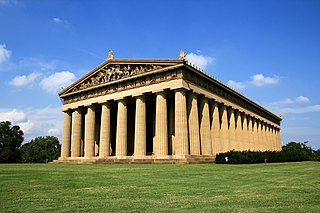
Nashville is the capital and most populous city of the U.S. state of Tennessee, and the seat of Davidson County. With a population of 689,447 at the 2020 U.S. census, Nashville is the 21st most-populous city in the United States, and the fourth most populous city in the southeastern U.S. Located on the Cumberland River, the city is the center of the Nashville metropolitan area, which is one of the fastest growing in the nation.

A semi-trailer truck, also known as a semitruck, is the combination of a tractor unit and one or more semi-trailers to carry freight. A semi-trailer attaches to the tractor with a type of hitch called a fifth wheel.

A truck or lorry is a motor vehicle designed to transport cargo, carry specialized payloads, or perform other utilitarian work. Trucks vary greatly in size, power, and configuration, but the vast majority feature body-on-frame construction, with a cabin that is independent of the payload portion of the vehicle. Smaller varieties may be mechanically similar to some automobiles. Commercial trucks can be very large and powerful and may be configured to be mounted with specialized equipment, such as in the case of refuse trucks, fire trucks, concrete mixers, and suction excavators. In American English, a commercial vehicle without a trailer or other articulation is formally a "straight truck" while one designed specifically to pull a trailer is not a truck but a "tractor".

A road train, land train or long combination vehicle (LCV) is a trucking vehicle used to move road freight more efficiently than semi-trailer trucks. It consists of two or more trailers or semi-trailers hauled by a prime mover.

A trackless train — or tram, road train, land train, or parking lot train is a road-going articulated vehicle used for the transport of passengers, comprising a driving vehicle pulling one or more carriages connected by drawbar couplings, in the manner of a road-going railway train. Similar vehicles may be used for transport of freight or baggage for short distances, such as at a factory or airport.
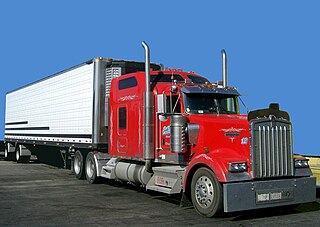
A commercial driver's license (CDL) is a driver's license required in the United States to operate large and heavy vehicles or a vehicle of any size that transports hazardous materials or more than 15 passengers.

The transportation system of New York City is a network of complex infrastructural systems. New York City, being the most populous city in the United States, has a transportation system which includes one of the largest subway systems in the world; the world's first mechanically ventilated vehicular tunnel; and an aerial tramway. New York City is home to an extensive bus system in each of the five boroughs; citywide and Staten Island ferry systems; and numerous yellow taxis and boro taxis throughout the city. Private cars are less used compared to other cities in the rest of the United States.
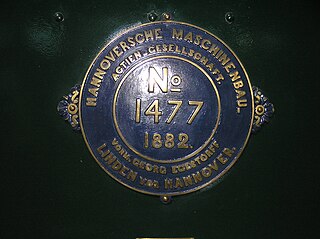
Hanomag was a German producer of steam locomotives, tractors, trucks and military vehicles in Hanover. Hanomag first achieved international fame by delivering numerous steam locomotives to Finland, Romania and Bulgaria before World War I and making of first tractor Hanomag R26 in 1924 in Germany. In 1925, they added automobiles to their line, additionally moving in 1931 into the production of construction machinery. Since 1989, the company has been part of the Komatsu company.

A party bus is a large motor vehicle usually derived from a conventional bus or coach, but modified and designed to carry 10 or more people for recreational purposes. Party buses can often include music systems, on board bars and dancing poles. The basis for interior design of partybuses are usually lighting effects based on modern LED panels and lasers as well as specially designed, comfortable, most often leather chairs and a professional dance floor. The first vehicles of this type appeared in San Francisco and were quickly popularized in the United States and around the world. Party buses are a type of vehicle that has become increasingly popular in recent years for hosting parties and events on the go. These buses are typically modified or customized to include amenities such as sound systems, disco lights, and even dance floors, making them a popular choice for bachelor/bachelorette parties, proms, and other special occasions.
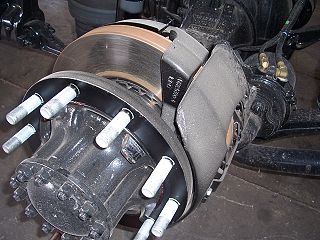
An air brake or, more formally, a compressed-air-brake system, is a type of friction brake for vehicles in which compressed air pressing on a piston is used to apply the pressure to the brake pad or brake shoe needed to stop the vehicle. Air brakes are used in large heavy vehicles, particularly those having multiple trailers which must be linked into the brake system, such as trucks, buses, trailers, and semi-trailers, in addition to their use in railroad trains. George Westinghouse first developed air brakes for use in railway service. He patented a safer air brake on March 5, 1872. Westinghouse made numerous alterations to improve his air pressured brake invention, which led to various forms of the automatic brake. In the early 20th century, after its advantages were proven in railway use, it was adopted by manufacturers of trucks and heavy road vehicles.
Truck classifications are typically based upon the maximum loaded weight of the truck, typically using the gross vehicle weight rating (GVWR) and sometimes also the gross trailer weight rating (GTWR), and can vary among jurisdictions.

In Canada, driver's licences are issued by the government of the province or territory in which the driver is residing. Thus, specific regulations relating to driver's licences vary province to province, though overall they are quite similar. All provinces have provisions allowing non-residents to use licences issued by other provinces and territories, out-of-country licences, and International Driving Permits. Many provinces also allow non-residents to use regular licences issued by other nations and countries. Canadian driver's licences are also valid in many other countries due to various international agreements and treaties.

Rickshaws are used in numerous cities in the United States, primarily for their novelty value as an entertaining form of transportation for tourists and locals. However, they also have environmental benefits and may be quicker than other forms of transport if traffic congestion is high. Various laws regulate their use in different cities.
Taxicabs and other vehicles-for-hire in Canada are regulated by local municipalities and provinces, and are owned & operated by private companies and individuals. Unlicensed cabs in some cities are referred to as bandit taxis/cabs.
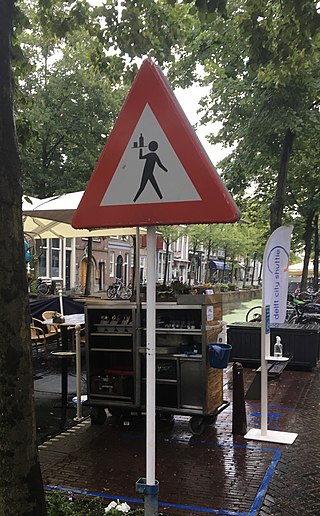
The road signs of the Kingdom of the Netherlands, as well as Suriname, are regulated in the Reglement verkeersregels en verkeerstekens 1990, commonly abbreviated as RVV 1990. While most previous signage, from the RVV 1966 (Dutch) remained legal and official, they have been updated / replaced. Some aren't official anymore and have lost legal validity, but most surviving old signs remained valid.
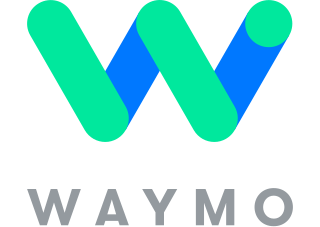
Waymo LLC, formerly known as the Google Self-Driving Car Project, is an American autonomous driving technology company headquartered in Mountain View, California. It is a subsidiary of Alphabet Inc., owner of Google, making it a sister company of the latter.
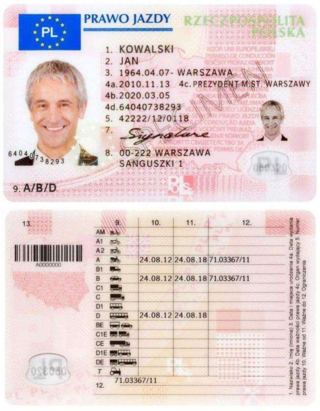
A driver's license is a legal authorization, or the official document confirming such an authorization, for a specific individual to operate one or more types of motorized vehicles—such as motorcycles, cars, trucks, or buses—on a public road. Such licenses are often plastic and the size of a credit card.
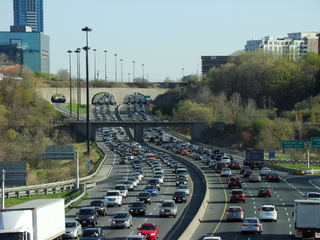
Terminology related to road transport—the transport of passengers or goods on paved routes between places—is diverse, with variation between dialects of English. There may also be regional differences within a single country, and some terms differ based on the side of the road traffic drives on. This glossary is an alphabetical listing of road transport terms.
Road signs in Latvia ensure that transport vehicles move safely and orderly, as well as to inform the participants of traffic built-in graphic icons. These icons are governed by the Vienna Convention on Road Traffic and Vienna Convention on Road Signs and Signals. The system is covered in Ceļu satiksmes noteikumi and the standards documents LVS 77–1:2016 "Ceļa zīmes. 1. daļa: Ceļa zīmes", LVS 77-2:2016 "Ceļa zīmes. 2. daļa: Uzstādīšanas noteikumi" and LVS 77-3:2016 "Ceļa zīmes. 3. daļa: Tehniskās prasības".















